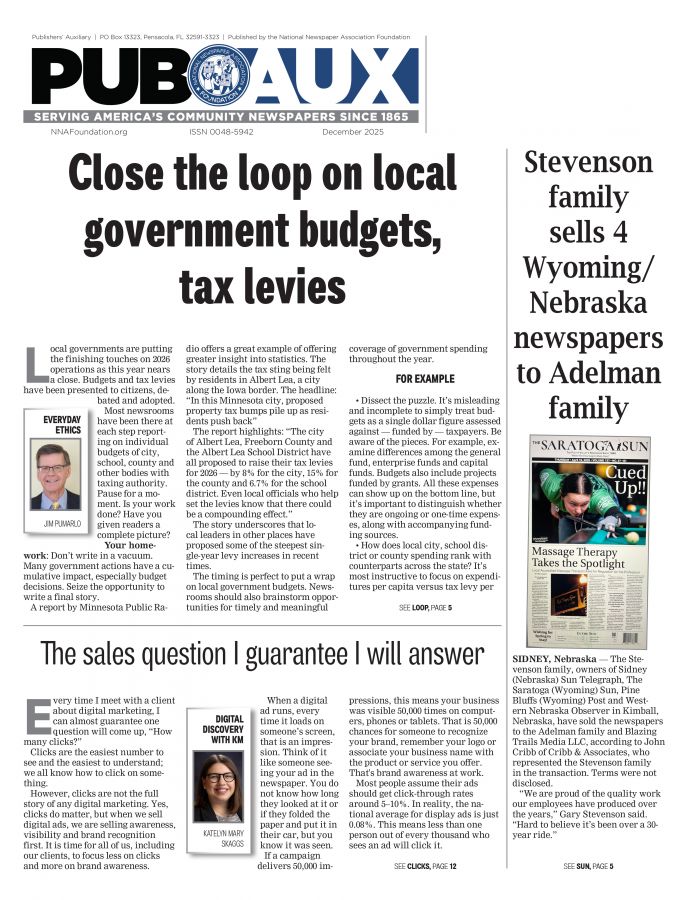GA paper wins fight against coal ash dump
May 3, 2017
By Teri Saylor
Special to Publishers’ Auxiliary
JESUP, GA—After a fight lasting 462 days, a fundraising effort yielding $1 million in pledges, letters of support from former President Jimmy Carter and Microsoft founder Bill Gates, three special sections and one coloring contest, 12,000 inches of free advertising worth $93,000, and too many hours of hard work to count, residents of rural Wayne County, GA, fought off the efforts of a Fortune 500 solid waste giant that proposed to dump millions of tons of coal ash in a local landfill.
Led by the twice-weekly Press-Sentinel, a locally owned newspaper in Jesup, GA, with a circulation of 6,000, the community banded together and stopped Republic Services from dumping 10,000 tons of coal ash per day in the county’s Broadhurst Landfill, which had the potential to pollute the fragile Georgia wetlands for years to come.
One would think a solid waste company the size of Republic, with landfills in 41 states, had won enough battles to consider a small town like Jesup would be a pushover. But Republic had never tangled with newspaper owner, Dink NeSmith, and the power of a feisty small-town newspaper.
“Too many times, outsiders come in here thinking we’re Mayberry, where Gomer and Goober live, but Republic realized we don’t work that way,” NeSmith said in a phone interview about a week after the waste company halted its plans to dump coal ash at the local Broadhurst Landfill.
“Strong newspapers make strong communities. We pump iron and ink into every edition,” he added.
Jesup, the seat of Wayne County, is home to 12,000 residents, and located about 40 miles inland from the Atlantic Ocean in southeast Georgia. Wayne County’s landmass is mostly swampy coastal plain and piney forestland. The Altamaha River flows along the northern border of Wayne County on its way to the sea, fed by streams and tributaries along the way. It is an ecologically sensitive area, inhabited by at least 120 species of rare or endangered plants and animals, reporter Derby Waters wrote in an email.
In 1994, a 1,000-acre landfill opened in Broadhurst, a small community located near Jesup. Two years later, the landfill was purchased by Republic Services, a solid-waste company worth billions of dollars. Today, the Broadhurst Landfill has doubled in size.
In January 2016, a Republic Services subsidiary filed an application with the U.S. Army Corps of Engineers to develop 25 acres of land near the landfill for a rail yard and four rail spurs at a length of 1 mile each off the CSX main rail line. This rail facility would be able to accommodate as many as 100 rail cars per day. The plan was for those cars to haul in 10,000 tons of coal ash every day from coal plants in other parts of the country—enough to bury a small community and its fragile ecosystem.
Waters learned about these plans from an environmental lobbyist who dropped by the newspaper and told him that the Army Corps of Engineers had applied for the permit to install the rail spur. At the time, the public notice announcing the permit had been published on the internet, rather than in the newspaper. A reporter from the Atlanta Journal-Constitution reported there had already been a leak at the landfill in 2011, which had never been disclosed to the public.
Coal ash was not a stranger to Wayne County. The Jacksonville (FL) Energy Authority had been trucking it into the Broadhurst Landfill for eight years.
Waters researched coal ash and discovered it contains 25 different hazardous materials, including the five most dangerous heavy metals: mercury, lead, cadmium, aluminum and arsenic.
NeSmith vowed to give everything he owns to save the wetlands area, where he was born and raised, and still calls home.
“I have eight grandchildren, and this is their heritage. I will go to my grave protecting my community and the environment,” he vowed.
On Jan. 13, 2016, the Press-Sentinel published its first article under the headline, “Company plans to bring coal ash, other waste here.”
NeSmith pulled out all the stops. He began writing columns and posting them to his blog: dinknesmith.com. He hired an editorial cartoonist. He published special sections and ran free advertising. He compiled a packet of articles, columns, editorial cartoons, letters to the editor and anything else he could find to support his efforts, and he shipped it off to Carter, along with a letter asking the former president to seek help from Bill Gates, who owns millions of shares of Republic stock.
On June 28, 2016, Carter sent a handwritten note to Gates, which read:
“Republic Services, one of your holdings, is planning to dump about 100 rail carloads of toxic coal ash in Southeast Georgia (Wayne County). This will adversely impact some favorite streams of mine, where my father took me fishing many years ago. I hope you will help to prevent this environmental denigration.”
Gates wrote back two months later with promises to ask Republic Services to look into it.
Meanwhile, The Press-Sentinel and the community kept fighting. They hired lawyers and raised money to kill the coal ash plans. NeSmith personally met with Republic’s area president, Drew Isenhour, three times to seek resolution.
“School kids broke into their piggy banks to give us donations, and we raised over $1 million in pledges for our legal fund,” NeSmith said. “We would have taken this all the way to the Supreme Court if we had to.”
NeSmith and community leaders wanted two things: they wanted Republic to pull the permit application to build a rail spur to the landfill site, and they wanted Republic to renegotiate its 50-year contract with the county.
Then, on April 6, 15 months after The Press-Sentinel learned that Republic was planning to dump coal ash in the local landfill, the solid-waste company announced it was withdrawing its rail spur and coal ash plans.
“I give great appreciation to Drew and Republic for listening and responding,” NeSmith said. “Drew promises the public will have a say in future contract re-negotiations. For now we can rest easier, and what happened is a giant step in the right direction.”
But there is still the issue of coal ash disposal, and the fence mending that needs to continue. And although the newspaper and the county will remain vigilant, NeSmith credits the entire community for rising up and fighting the good fight.
“We had some angels light on our shoulders, and one of them was President Carter,” NeSmith said. “We want to continue working with Republic in good faith and resolve the coal ash problem. I am inspired to find a resolution.”
The battle has renewed NeSmith’s faith in the power of the press and re-fueled his interest in running his newspapers in Florida, Georgia and North Carolina—most of them under the Community Newspapers Inc. banner, which he owns with his longtime business partner Tom Wood. The Press-Sentinel is not a part of that group. It is his hometown paper in Jesup, and the first newspaper NeSmith bought 40 years ago.
“In 2006, we had a chance to sell our newspapers for an unbelievable amount of money by any standards, and we chose not to,” he said. “Then their values plummeted. I thought, ‘There must be some reason we chose to keep the newspapers,’ and my answer came in January 2016.”
NeSmith’s sons, Eric and Alan, are active in the company, and he enjoys working with them. He views them as part of the future of journalism, which he believes is alive and well because of the watchdog role they play in their local communities.
“This is what newspapers are all about,” he said. “I contend that while print journalism might be in an upheaval, I believe the future is bright because no one else can or will do what we’re doing. We got the prize we wanted. Now we live in a safer environment. A little rebellion every now and then is a good thing.”
Throughout the entire ordeal, NeSmith often compared his fight against Republic to the Biblical battle between David and Goliath. He kept in touch with environmentalists in other parts of the country, including Wendell Berry, the noted poet, author and environmentalist, with whom he frequently corresponded.
After Republic Services announced they were halting their efforts to dump coal ash in Wayne County, NeSmith received a handwritten note of congratulations from Berry with a P.S. that read: “David won.”
Keeping coal ash out of Wayne County—by the numbers
Number of DinkNeSmith.com blog posts: So far, 59 columns published in the newspaper and posted on DinkNeSmith.com.
Number of editorial cartoons: 70+.
Number of written editorials in The Press-Sentinel: 19.
Number of special sections by The Press-Sentinel: Three on toxic coal ash.
Number of letters written by Dink NeSmith: 16 including: 3 to Bill Gates, a Republic Services board member; 2 to Michael Larson, Gates’ chief investment officer; 2 to the CEO, officers and directors of Republic Services Inc.; 5 to President Jimmy Carter; 1 to Jay Leutze, author/attorney “Stand Up That Mountain;” 3 to Wendell Berry, Kentucky author and environmentalist, and hundreds of emails.
Number of letters to the editor in The Press-Sentinel: Dozens.
Number of U.S. presidents advocating for Wayne County’s environment: 1 Jimmy Carter.
Number of inches of free advertising provided by The Press-Sentinel: 12,000+.
Number of dollars in value of the free advertising provided by the Press-Sentinel: $93,000+.
Number of town hall meetings conducted: 1 in March 2016.
Number of local residents who would have been directly impacted by the coal ash: In Wayne County, the entire population of 32,000 plus downstream citizens in Coastal Georgia.
Number of acres the Broadhurst Landfill consumes: 2,200 acres.
Number of miles of the proposed rail spur: 4 sets of tracks, each 1 mile long.
Number of days the controversy lasted (from the day the story broke until the day Republic announced it was suspending the coal ash dump and pulling the rail spur permit application): 462.
Number of dollars raised to fight the coal ash proposal: More than $100,000; pledges of more than $1 million.
Number of toxic heavy metals existing in coal ash: 25 including aluminum, antimony, arsenic, barium, beryllium, cadmium, calcium, chromium, cobalt, copper, iron, lead, magnesium, manganese, mercury, molybdenum, nickel, potassium, selenium, silver, sodium, stronium, tin, vanadium, zinc.
Number of endangered species of wildlife in the Altamaha River wetlands area? At least 120 species of rare or endangered plants and animals live in the Altamaha River watershed, including 11 species of pearly mussels, seven of which are endemic to the Altamaha. The river basin also supports the only known example of old-growth longleaf pine and black oak forest in the U.S. Other notable species include shortnose sturgeon, Atlantic sturgeon, West Indian manatee, Eastern indigo snake, greenfly orchid, and Georgia plume. The unusual Franklin alatamaha tree, now extinct in the wild, was found by John Bartram along the Altamaha River in 1765.
Numbers of friends on Concerned Neighbors of Wayne County Facebook page: 826.
Number of meetings held involving Republic officials and the city council, The Press-Sentinel, or town hall meetings: Zero with the city, 1 countywide with Republic, EPD and county commissioners in March 2016.
Number of lawyers retained to fight against the coal ash proposal: 7 lawyers—3 in Augusta; 2 on St. Simons Island; 1 in the Netherlands.
Number of employees with Republic Services: 33,000 worldwide.*
Number of communities and municipalities served by Republic Services: 2,700+ in 41 states and Puerto Rico.*
Number of dollars in revenue in 2016: $9.2 billion.**
Number of stories written by The Press Sentinel: 75.
Number of columns written by Derby Waters: 16.
Number of times the newspaper hired a pilot to fly over Broadhurst Landfill to take photographs: 3.
Number of times Dink NeSmith testified before EPD or other public hearings: 6.
Number of miles driven Dink drove to fight coal ash: 12,400, estimated.
Bill number for new legislation that was passed because of this coal-ash fight: HB 1028 was passed into law days before the 2016 Georgia Legislative session ended. It requires public notice of toxic coal-ash spills or leaks in landfills like the one in 2011, which the public didn’t know about for five years, until an Atlanta Journal-Constitution reporter, researching the coal-ash story, dug up reports detailing the toxic chemicals that had leaked into the soil and drinking water.
*Republic Services website: republicservices.com
**Forbes: The World’s Biggest Companies: forbes.com/companies/republic-services/







